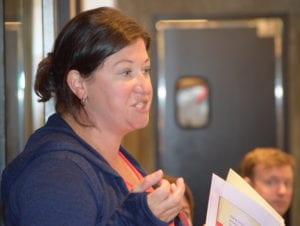Who is a member?
Our members are the local governments of Massachusetts and their elected and appointed leadership.

Concord Deputy Town Manager Kate Hodges describes her town’s use of Facebook Live to boost public participation during the July 18 meeting of the Massachusetts Municipal Management Association in Boston.
By leveraging the transformational power of technology, Massachusetts cities and towns are reimagining services from citizen engagement to trash pickup.
Several local officials discussed their technology experiments during the July 18 meeting of the Massachusetts Municipal Management Association in Boston’s Seaport district.
Some towns are using technology to increase citizen participation and hear from their quieter constituent groups. After hiring a public information officer in 2015 and setting up social media accounts, Concord Deputy Town Manager Kate Hodges said her town sought other ways to engage the public.
“It seemed like people were really hungry for the information,” Hodges said. “But we needed to have a new and innovative and different way to get it to them.”
Recently, the town started showing some public meetings on Facebook Live, allowing residents to email questions during the meeting, or within three days. A copy of the questions and answers gets attached to the meeting minutes.
Hodges said the inspiration came while she was driving to work and heard a radio station promote a Facebook Live event.
In neighboring Sudbury, officials are using online polling to gauge support for projects and spending priorities, said Sudbury Town Manager Melissa Murphy-Rodrigues. Working with the company FlashVote since last year, Sudbury has used two online polls to gather opinions about large-scale projects.
Murphy-Rodrigues, who will become North Andover’s town manager in September, said FlashVote verifies the residency of polling respondents and takes measures to block repeat voting. Each poll stays open for 48 hours, after which all participants receive the results. She said the option encourages residents who might be afraid to speak up at a public meeting.
“We all feel like we’re moving in one direction when residents are part of the process,” she said.
Dean Shankle, the former town administrator in Hooksett, N.H., discussed his experience hiring Zencity, a company that tracks and analyzes social media posts about their clients. The data allowed Hooksett to include more resident viewpoints in public discussions, and gave Shankle more insight into town developments.
“There were things going on in the business community that I had no idea about,” said Shankle, who is now the town administrator in Amherst, N.H.
Technology can also help municipalities manage services that used to occupy the low-tech realm. Dan Riviello, Cambridge’s 311 project manager, said the merger of two city technologies reduced the blight of overflowing city trash bins. Cambridge had been using the SeeClickFix app, which allows residents to report problems such as potholes and broken streetlights, and in public areas, the city had about 130 “smart” Bigbelly trash bins, which would send separate alerts when the bins got 80 percent full.
Unfortunately, Cambridge employees had reached notification-system overload, and didn’t check the Bigbelly alerts, Riviello said. So last year, the city got the two computer systems to communicate with each other, increasing the odds that employees would see the trash alerts, and reducing the need for humans to report overflowing bins. Resident complaints about the Bigbelly bins have dropped 13 percent from last year, and 89 percent this quarter from last, he said.
“We’re getting the information sooner, before residents are seeing trash on the streets and having to complain to the city that they’re not doing their job with these bins overflowing,” Riviello said.
Other communities are looking at new ways to solve transportation problems. Since April, Brookline has been running an electric-scooter trial to help bridge the gaps in local transit, said Town Administrator Mel Kleckner. In the first three months, 15,000 users took 65,000 scooter rides.
Kleckner said that Brookline has struggled with getting riders to obey rules of the road. He said the town’s three scooter vendors are exploring ways in which the technology can help control who uses the scooters, where the scooters can safely go, where they get dropped off, and whether users are wearing helmets.
The city of Newton has teamed up with New York company Via to provide on-demand, subsidized transportation services to seniors. The service is similar to Uber or Lyft, except that hours and destinations are limited, and the vans often carry multiple passengers at the same time.
Nicole Freedman, Newton’s transportation planning director, said the technology has brought seniors a faster, more reliable service, but there have been challenges in introducing new technology: Many of the older seniors are more likely to call the phone reservation line than use the app.
“Hand holding is required,” Freedman said. “We were prepared for that, but we could do much more hand holding.”
The Management Association meeting ended with a photo tribute to Rocco Longo, a long-time town administrator who passed away on July 7 after a brief illness.